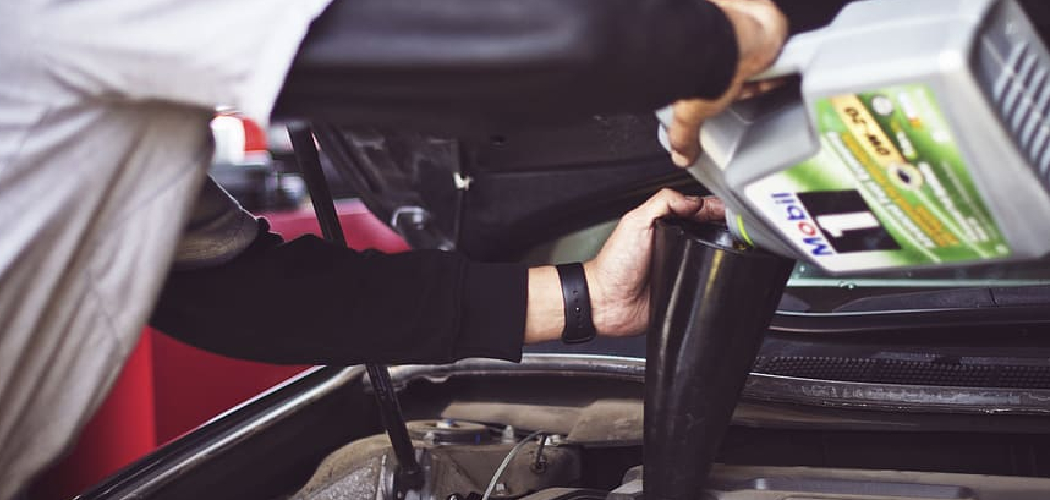Diesel engines are renowned for their durability and efficiency, making them a preferred choice for heavy-duty transportation and industrial machinery. A critical factor in maintaining a diesel engine’s performance is ensuring the cleanliness and integrity of its oil.
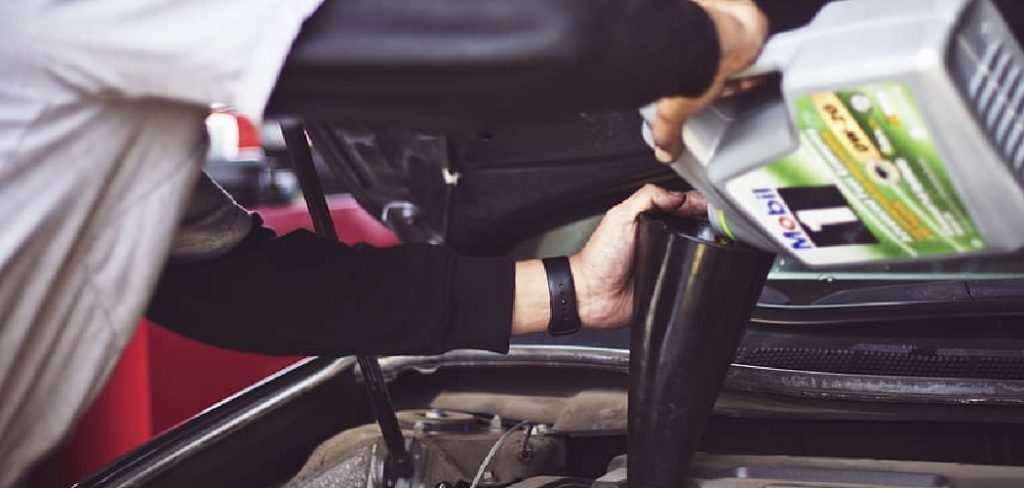
Proper lubrication minimizes wear, reduces friction, and keeps the engine components cool, but when engine oil becomes contaminated, it can lead to a host of problems, including reduced engine life and increased maintenance costs. In this guide on how to keep diesel engine oil clean, we’ll explore effective strategies for keeping your diesel engine oil clean, extending the life of your engine, and optimizing its performance.
What is Diesel Engine Oil?
Before diving into the methods for keeping diesel engine oil clean, it’s essential to understand what it is and how it works. Diesel engine oil is specifically designed for use in diesel engines and differs from traditional gasoline engine oil due to a few key characteristics.
Diesel engines operate at higher temperatures and pressures than gasoline engines, so their oil must have a higher viscosity index to maintain proper lubrication. Diesel engine oil also contains more additives, such as detergents and dispersants, to combat the byproducts of diesel combustion, including soot and acid formation.
Why is Clean Oil Important for Diesel Engines?
As mentioned earlier, contaminated engine oil can cause numerous problems for diesel engines. When dirt, debris, or other contaminants enter the oil, they can reduce its lubrication properties and cause increased wear on engine components. This wear can lead to decreased performance and potentially costly repairs.
Additionally, dirty oil can also form sludge deposits, which can block oil passages and prevent proper lubrication, resulting in overheating or even complete engine failure. Maintaining clean oil is crucial for ensuring the longevity and efficiency of diesel engines.
Needed Materials
High-quality Diesel Engine Oil
The first step in keeping diesel engine oil clean is to choose a high-quality oil designed specifically for use in diesel engines. Using the correct grade and type of oil recommended by the manufacturer is essential for optimal performance. High-quality oils typically have better detergency, dispersancy, and anti-wear properties, making them more effective at keeping the engine clean.
Oil Filter
Oil filters are an integral component of the engine’s oil system and play a crucial role in keeping the oil clean. They work by removing contaminants and impurities from the oil as it circulates through the engine. However, over time, oil filters can become clogged with debris, reducing their effectiveness. It’s essential to regularly replace your oil filter according to the manufacturer’s recommendations to ensure clean oil circulation.
Oil Analysis Kit
To monitor the cleanliness and condition of your diesel engine oil, it’s helpful to use an oil analysis kit. These kits allow you to take a small sample of your engine oil and send it to a lab for analysis. The results will provide valuable insights into the overall health of your engine and any potential issues that may need to be addressed.
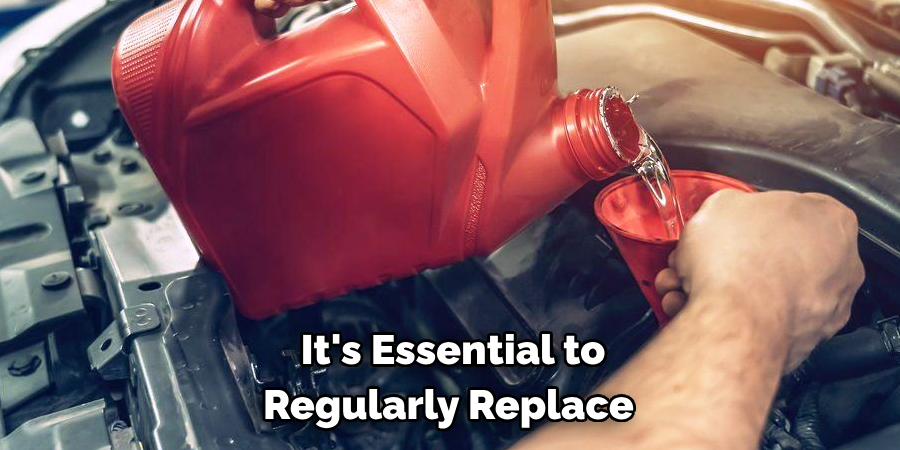
10 Step-by-step Guidelines on How to Keep Diesel Engine Oil Clean
Step 1: Begin with the Right Oil
As mentioned earlier, choosing a high-quality diesel engine oil is critical for keeping it clean. Refer to your engine’s manual or consult with a professional mechanic to determine the correct grade and type of oil for your specific engine.
The right oil will help maintain proper lubrication, reduce wear, and keep your engine clean. You can also look for oils with additional cleaning and dispersing properties for added protection. The initial cost of high-quality oil will pay off in the long run by reducing maintenance and repair costs.
Step 2: Regularly Change Your Oil
Regular oil changes are essential for maintaining clean engine oil. Over time, the oil can become contaminated with dirt, debris, and other impurities, reducing its effectiveness.
Refer to your engine’s manual for the recommended oil change intervals. For heavy-duty diesel engines, this is typically every 10,000-15,000 miles or every six months. The frequency may vary depending on the engine’s age, operating conditions, and oil quality.
Step 3: Check Oil Levels Regularly
In addition to changing the oil regularly, it’s crucial to check the oil levels frequently. Low oil levels can lead to increased wear and overheating while overfilling can cause foaming and inadequate lubrication. Follow the manufacturer’s guidelines for checking oil levels and top up when necessary.
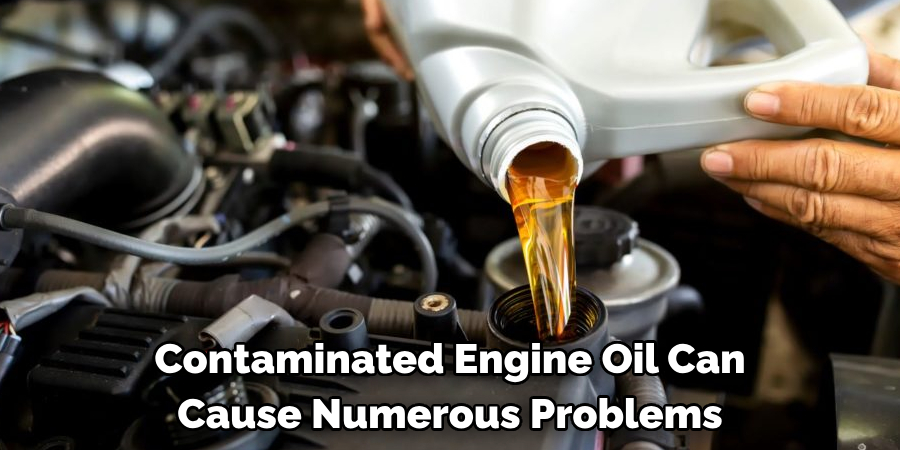
You can also use an oil analysis kit to monitor the condition of your oil and determine when it needs changing. It’s essential to maintain the correct oil level for optimal engine performance. The oil should also be changed if it appears dirty or has a milky appearance, indicating water contamination. But, if the oil level drops too quickly, this could be a sign of a more significant issue that needs to be addressed.
Step 4: Use Quality Filters
As mentioned earlier, oil filters play a vital role in keeping engine oil clean. It’s essential to use high-quality filters that meet the manufacturer’s specifications. Cheaper or lower-quality filters may not effectively remove contaminants, leading to dirty oil and potential engine damage.
Refer to the manufacturer’s recommendations for filter type and change intervals. The general rule is to change the oil filter every time you change the engine oil. You can also consider using a synthetic filter that has a longer lifespan and better filtering capabilities.
Step 5: Change Filters Regularly
Like oil changes, regularly changing your filters is crucial for maintaining clean diesel engine oil. Over time, filters can become clogged with contaminants, reducing their effectiveness. Refer to the manufacturer’s guidelines for recommended replacement intervals.
If you operate your vehicle under harsher conditions, such as dusty environments or frequent towing, you may need to change the filters more frequently. The oil filter should also be changed if the oil appears dirty when checking the levels.
Step 6: Keep External Components Clean
It’s essential to keep external engine components, such as the breather and filler cap, clean to prevent contaminants from entering the oil. Regularly check these components for buildup or debris and clean them as necessary.
It’s also crucial to ensure that these components are properly sealed to prevent dust, dirt, and other contaminants from entering the engine. The breather and filler cap should also be checked during oil changes to ensure they are functioning correctly.
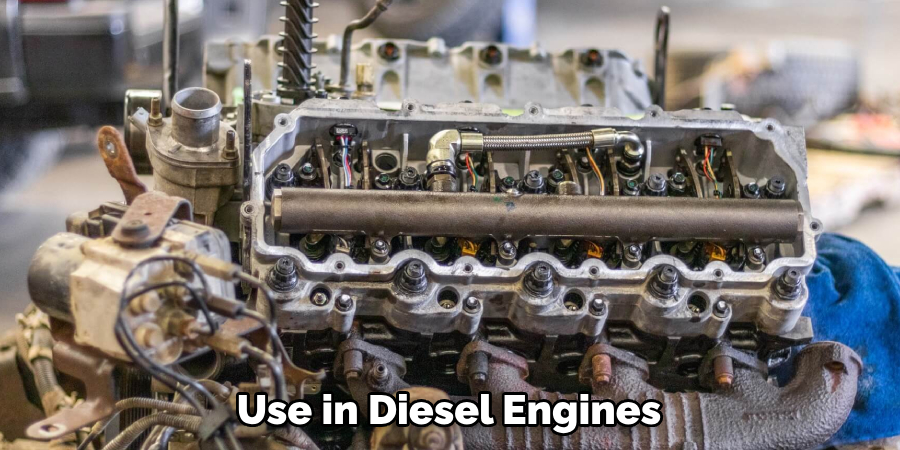
Step 7: Regularly Change Fuel Filters
Along with oil filters, fuel filters also play a crucial role in keeping diesel engine oil clean. It’s essential to regularly change fuel filters according to the manufacturer’s recommendations to prevent contaminants from entering the engine and potentially damaging it. Although fuel filters are typically smaller and less expensive than oil filters, they are just as important for maintaining clean engine oil.
Step 8: Address Any Leaks
Oil leaks can lead to significant issues if left unaddressed. They not only reduce the amount of oil in the engine but also allow contaminants to enter. Regularly check for any leaks and address them promptly to prevent damage to the engine and maintain clean oil.
But, if you notice a significant decrease in oil levels or frequent need to top up, this could also indicate an underlying problem that needs to be addressed. The longer a leak is left unattended, the higher the potential for engine damage.
Step 9: Properly Dispose of Used Oil
Practicing proper oil disposal is crucial for the environment and your engine’s health. Used oil should never be dumped into the environment or disposed of in household waste. Instead, it should be properly recycled and disposed of according to local regulations.
Many automotive shops and recycling centers offer used oil collection services. But, if you choose to change your oil at home, ensure that the used oil is stored and transported in a sealed container to prevent spills.
Step 10: Monitor Engine Performance
Regularly monitoring your diesel engine’s performance can also indicate potential issues with the oil. If you notice a decrease in engine power, increased exhaust emissions, or unusual noises, this could be a sign of dirty or contaminated oil. It’s essential to address these issues promptly to prevent further damage and maintain clean engine oil. Regularly scheduled maintenance and timely repairs are crucial for keeping your diesel engine running smoothly and efficiently.
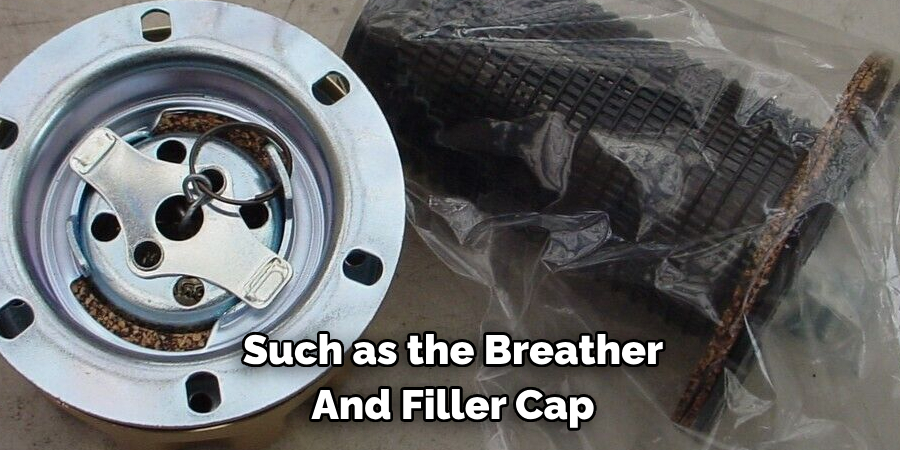
By following these steps on how to keep diesel engine oil clean, you can ensure that your engine oil remains clean and performs at its best in the long run. Overall, maintaining clean diesel engine oil is crucial for maximizing the lifespan and performance of your engine, saving you time and money in the long run. Don’t neglect regular oil changes and proper maintenance to keep your diesel engine running smoothly for years to come.
Contamination Prevention Strategies
In addition to following the steps above, there are other preventative measures you can take to keep your diesel engine oil clean. These include:
- Properly Sealing Fuel and Oil Tanks to Prevent Dust and Moisture From Entering.
- Regularly Checking All Connections for Leaks and Addressing Them Promptly.
- Using High-quality Fuel With Proper Filtration Systems in Place.
- Installing a Bypass Filtration System to Supplement the Primary Oil Filter and Remove Smaller Contaminants.
- Keeping the Engine Running at Optimal Operating Temperature as This Helps Burn Off Impurities in the Oil.
By implementing these strategies and following the steps outlined above, you can ensure that your diesel engine oil remains clean and your engine runs efficiently for years to come. Remember, regular maintenance is key to keeping your vehicle running smoothly and preventing costly repairs down the road.
Addressing Contamination Issues
If you suspect that your diesel engine oil may be contaminated, it’s essential to address the issue promptly. Here are some steps you can take:
- Change the Oil and Filters Immediately.
- Check for Any Leaks or Damage That May Have Caused the Contamination.
- Inspect All External Components, Such as Breathers and Filler Caps, for Buildup or Damage.
- Consider Using a High-quality Additive to Help Clean and Protect Your Engine.
- If the Contamination is Severe, Consult a Professional Mechanic for Further Inspection and Repairs.
Environmental Considerations and Disposal
Properly disposing of used oil and filters is not only crucial for your engine’s health but also for the environment. Used oil can be hazardous to wildlife, water sources, and vegetation if not disposed of correctly. Here are some tips for proper disposal:
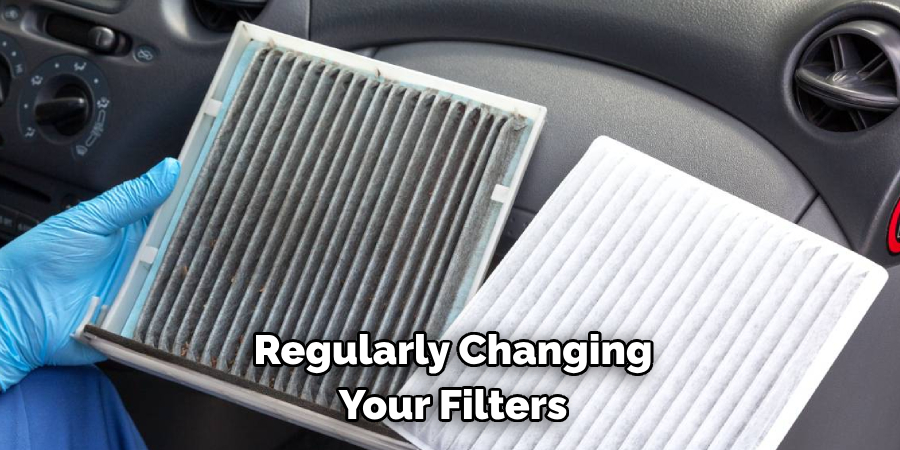
- Check Local Regulations for Proper Disposal Methods.
- Never Dump Used Oil or Filters Into the Environment.
- Store and Transport Used Oil and Filters in Sealed Containers to Prevent Spills.
- Consider Using a Recycling Service or Dropping Off Used Oil at Designated Collection Centers.
- Properly Dispose of Empty Oil Containers as Well.
By following these guidelines, you can do your part in protecting the environment while also maintaining clean diesel engine oil.
Additional Resources
For further information and resources on how to keep diesel engine oil clean, consider consulting reputable sources such as:
- The American Petroleum Institute (API)
- The Society of Automotive Engineers (SAE)
- Your Vehicle’s Manufacturer or Owner’s Manual
- Local Mechanic or Automotive Shop
- Online Forums and Communities for Diesel Engine Owners.
Remember, staying informed and proactive is key to maintaining clean diesel engine oil and maximizing the performance of your vehicle. So, be sure to stay updated on industry standards and best practices for keeping your engine running smoothly.
How Much Could It Cost?
The cost of maintaining clean diesel engine oil can vary depending on several factors, such as the type and quality of oil used, frequency of oil changes, and any additional maintenance or repairs needed.
However, in the long run, properly maintaining clean oil can save you money by preventing costly repairs and prolonging your engine’s lifespan. Consult with a professional mechanic for an accurate estimate based on your specific vehicle and driving habits.
The cost of regular oil changes and maintenance is a small price to pay for the long-term health and efficiency of your diesel engine. Overall, investing in proper maintenance and care for your engine can save you time, money, and potential headaches in the future.
It’s an essential aspect of responsible vehicle ownership that should not be overlooked. So keep these tips in mind as you continue to enjoy the power and reliability of your diesel engine. Keep it clean, and it will keep on running strong!

Frequently Asked Questions
Q1: How Often Should Diesel Engine Oil Be Changed?
A1: This can vary depending on the specific vehicle and manufacturer’s recommendations. Typically, it’s recommended to change the oil every 5,000 to 7,500 miles or every six months. The best way to determine the appropriate interval for your vehicle is to consult the owner’s manual.
Q2: How Can I Tell If My Diesel Engine Oil Needs to Be Changed?
A2: Some signs that indicate it may be time for an oil change include a decrease in engine performance, increased exhaust emissions, or unusual noises. It’s also important to regularly check the oil level and color. If the oil is low or looks dark and dirty, it may be time for a change.
Q3: Can I Use Regular Motor Oil in My Diesel Engine?
A3: It’s not recommended to use regular motor oil in a diesel engine. Diesel engines require heavy-duty oils with higher viscosity levels to withstand the extreme heat and pressure of their operation. It’s best to use oil specifically designed for diesel engines.
Q4: Can I Overfill My Diesel Engine Oil?
A4: Yes, overfilling the oil can be just as harmful as having too little. It can cause foaming and air bubbles in the oil, leading to inadequate lubrication and potential engine damage. Always follow the recommended oil level for your vehicle.
Q5: What Happens If I Don’t Change My Diesel Engine Oil Regularly?
A5: Failing to change the oil regularly can lead to a buildup of contaminants and impurities in the oil, potentially causing damage to engine components and reducing performance. It’s important to stick to a regular maintenance schedule for optimal engine health.
Overall, properly maintaining your diesel engine oil is crucial for the longevity and performance of your vehicle. By following these strategies and addressing contamination issues promptly, you can ensure that your diesel engine runs smoothly and efficiently for years to come. Remember to always consult reliable sources and consult a professional mechanic if you have any concerns or questions.

Conclusion
In conclusion, maintaining the cleanliness of diesel engine oil is paramount for the longevity and efficiency of your engine. By implementing regular oil changes, using high-quality oil and filters, monitoring for contaminants, and adhering to a strict maintenance schedule, you can ensure that your diesel engine operates at peak performance.
Remember that preventive care is the most cost-effective strategy to avoid the downtime and expense of repairs. Stay proactive in your diesel engine maintenance, and it will continue to serve as a reliable power source for years to come. Thanks for reading this article on how to keep diesel engine oil clean.

